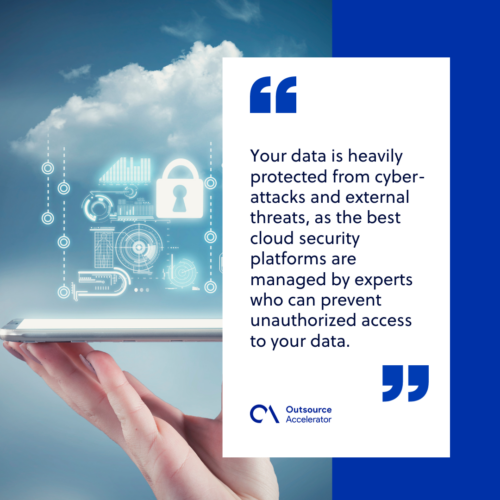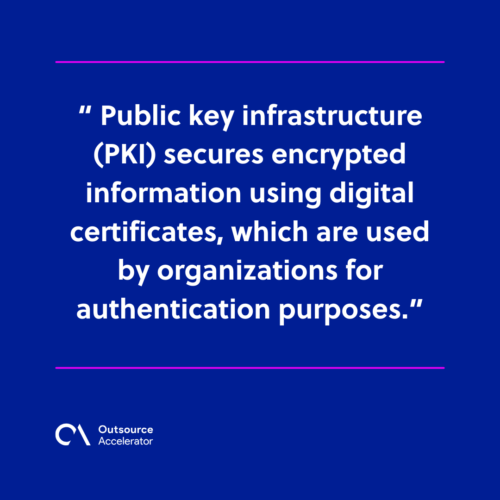Defining cloud security and its importance

The cloud makes it easier to access applications, store important data, and manage various operations across the business.
However, without the proper security measures, cloud-based environments could experience some drastic effects.
As more businesses migrate all facets of the company to the cloud, maintaining security is all the more important.
This article dives deeper into cloud security and why it is a priority for your business.
What is cloud security?
Cloud security is a type of cyber security that protects cloud-based infrastructures, including applications and confidential information.
A cloud-based infrastructure requires just as much safety as a physical one, but because it is online, new approaches to security are crucial.
Various cloud security methods are implemented to safeguard these assets from cyber attacks, data breaches, and other forms of unauthorized access.

Why is cloud security important?
Most modern businesses have been transitioning from physical, on-site hardware to online cloud-based settings.
Leaving all your data vulnerable on the cloud makes it easy to access and appeals to external threats and attackers.
Your assets are never completely safe when in a cloud setting, meaning organizations must take extra steps to protect their data servers’ integrity.
Otherwise, companies that fail to implement robust security measures could face major compliance risks and data loss, which could lead to serious legal and financial repercussions.
Benefits of cloud security
Implementing strict cloud security measures, especially when you no longer have offline defenses, could bring a lot of advantages to your business.
Lower costs
On-site infrastructure requires dedicated hardware and resources to keep data safe, but cloud security helps reduce those costs. Instead, you can use that money to invest in upgraded security measures.
Recovering lost or stolen data will cost a significant amount, meaning good cloud security will prevent those losses.
Improved protective measures
Cloud security offers increased protection for your data by limiting access control, implementing encryption, and data loss prevention.
Your data is heavily protected from cyber-attacks and external threats, as the best cloud security platforms are managed by experts who can prevent unauthorized access to your data.

xIncreased availability
Cloud security ensures that your data can be readily accessed by authorized users at any time.
With a solid cloud security platform, you can improve the protection of these networks and create a streamlined monitoring system.
This allows you to manage your software and implement recovery plans if needed. An additional benefit of this is it can be done remotely.
Scalability
Cloud security makes it easier to scale up or down depending on the volume of data. It becomes a lot easier to manage your applications and information storage to accommodate new ones and get rid of the unnecessary ones.
Threats to cloud security
Despite its array of advantages, migrating to the cloud also has its disadvantages. Your data can be vulnerable to external risks like the following:
Lack of visibility
Your resources are managed by a third party, making visibility tools unusable in a cloud setting. This makes it difficult to monitor your assets and how they are accessed.
Misconfigurations
Companies who fail to manage their security settings are vulnerable to misconfigurations, which may open the door for data breaches.
Some forms of misconfigurations include misplacement of passwords, failing to encrypt data, or bypassed permission controls.
Access management
Due to its easy accessibility, people outside your organization or anyone with internet access could access your cloud assets from anywhere.
This leaves your data vulnerable to thieves or attackers, especially if you have mismanaged protective measures.
Compliance issues
The cloud requires you to comply with a strict set of compliance regulations. It can be difficult for companies to manage it all at once, even if there is no data breach.
It is more difficult to manage than on-site data centers where you have complete control.
How to maintain cloud security
The only way to keep your cloud data secure is to proactively apply the necessary safety measures, such as the following:
- Encryption – End-to-end encryption keeps your data safe from being accessed, while being transferred. Your data cannot be accessed without an encryption key, which only you possess.
- Configuration – Cloud configuration is managing the permissions of your data to limit access. This includes creating strong passwords or changing the default settings.
- Public key infrastructure – Public key infrastructure (PKI) secures encrypted information using digital certificates, which are used by organizations for authentication purposes.
- Identity management – These tools allow organizations to monitor and control who has access to cloud-based resources.

Invest in robust cloud security
The cloud is a powerful tool that houses an organization’s important data, making cloud security all the more important.
Strong cloud security is a worthwhile investment as it keeps confidential information safe on all fronts and prevents the serious repercussions of cyberattacks and data loss.
Further, partnering with dependable service providers such as Cloudstaff can strategically enhance your cloud security investment.







 Independent
Independent




